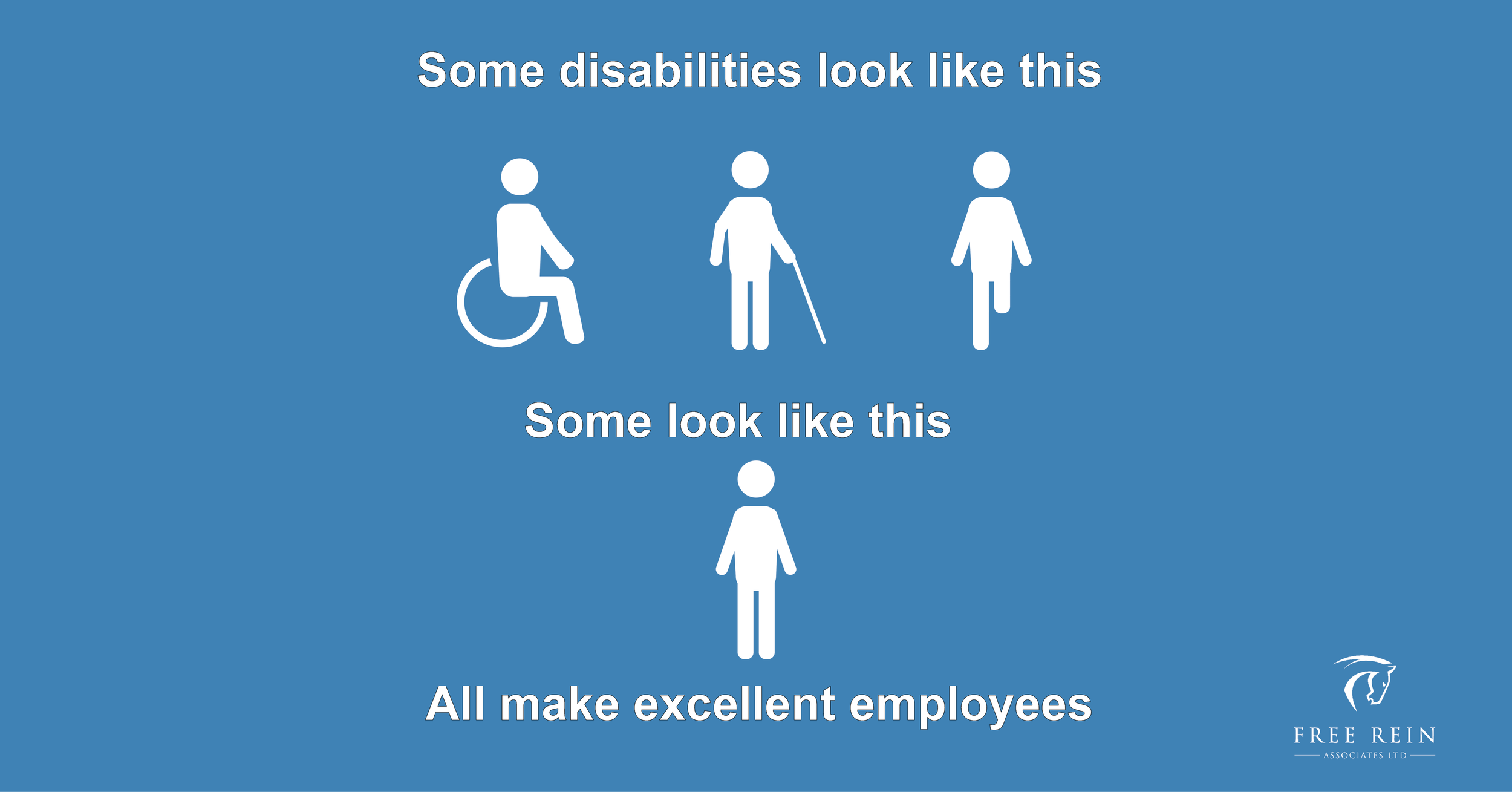
Blog
Looks Can Be Deceiving: Understanding Invisible Disabilities
The word disabled usually evokes images of wheelchairs, canes, ramps, or other visible indicators of an impairment: sign language, hearing aids etc. But there are many disabilities that are considered hidden or invisible. Here are two examples.
The word disabled usually evokes images of wheelchairs, canes, ramps, or other visible indicators of an impairment: sign language, hearing aids etc. But there are many disabilities that are considered hidden or invisible. Here are two examples.
What you see: Melanie
Melanie is a 29-year-old mom, dressed in flop flops and a pretty summer dress with two toddlers in car seats. With her permit displayed, she parked her car in the handicapped parking spot, grabbed the kids, and quickly walked with ease into the grocery store. Close behind her was a man who appeared to be very agitated. He confronted her in front of the store and angrily demanded to know why she had the handicapped parking permit and why she was using a handicapped parking when she obviously wasn’t disabled. He scanned her body up and down and then called Melanie a scam artist and told her she should be ashamed of herself. Other people lined up at the cash looked at her with disgust and shook their heads in disbelief. Melanie was humiliated but carried on with her errands.
What you don’t see: Melanie
Melanie is a 29-year-old mom who suffers from COPD as a result of pneumonia as a young child. Chronic Obstructive Pulmonary Disease, or COPD, is an umbrella term for a range of progressive lung diseases and is the fourth leading cause of death in Canada. Melanie is able to walk short distances but a basic grocery shopping trip can leave her out of breath, dizzy, disoriented, and unable to walk more than a few meters. By just looking at her, nobody would ever guess that Melanie has a disability. In fact, it took a serious incident involving her passing out in the middle of a crosswalk for Melanie to even admit that she had a disability because she was afraid of being judged and labeled. Melanie has had her parking pass for over a year and has been harassed over a dozen times by strangers who question her disability or ask her to prove that she is entitled to accessible parking.
What you see: Larry
Larry is a 45-year-old single man. He works in a production line at a parts factory. For eight hours a day he is stationed on the line flipping components as they are fed into the paint sprayer booth. Larry looks strong and healthy, although a little overweight. At the end of the day, he is usually winded and red faced and often pulls up a tall stool to sit for the last hour of his shift. The other workers on the line aren’t allowed to sit when working and the shift supervisor, Linda seems to turn a blind eye to Larry’s behaviour. The other workers are angry that Larry is apparently allowed to be so lazy and they question among themselves why he is subject to special treatment. Behind his back they call him Larry the Lump and make fun of him after hours.
What you don’t see: Larry
Four years ago, Larry was involved in a horrifying car crash that almost claimed his life. He lost his wife and two children in the accident, and he suffered a traumatic back injury. The PTSD that resulted from the loss of his family left him alienated from family, prone to wild mood swings, paranoid and hyper alert. To add to the misery of his PTSD, the back injury makes it difficult for Larry to stand or sit for extended lengths of time and left him with lingering pain that is just barely managed with pain medication. Larry has worked at the plant for 15 years and the management felt that they would honour his commitment to the company and accommodate Larry’s special needs by providing him with a stool to sit whenever he needed it. Nobody who works around him knows what Larry deals with on a daily basis.
You Don’t Always Know Who Is Living With A Disability
The list of recognized disabilities includes many invisible conditions that seriously impair a person’s ability to live life to the fullest. Invisible disabilities include chronic pain, chronic fatigue, muscular skeletal conditions, learning disabilities, and a full spectrum of mental illness including psychiatric conditions. There are millions of Canadians who deal with invisible challenges every day.
Many Employers Know Creating An Inclusive Workplace Is Important, But They Need Help With The How
The Disability Inclusive Employer Self-Assessment is the first of its kind: a disability inclusion self-assessment designed for Canadian employers which helps them gauge their current state and connect to resources to help them improve. It takes about 15 minutes to complete, and it’s free to access.
How do you create an inclusive workplace? Research shows that some of the keys to creating inclusive environments are exactly as you would guess: researchers see that when an employer focuses most on what a potential employee can do, instead of what they can’t, employees are more likely to succeed. Similarly, when an employer is willing to be flexible, and consider how an employee might work best, perhaps remotely or with a less than traditional schedule, talented people stay in their jobs longer.
In today’s labour market, where many industries are experiencing critical staff shortages, we know employers are primed to do what is needed to tap into talent they may have overlooked before. It’s prime time that employers looked to people with disabilities to fill their labour needs.
When Open Door Group and Presidents Group, two BC based non-profits focused on disability and employment, decided to partner on a project to help employers tap into this underutilized labour pool, that’s where we chose to focus. How do we make a practical tool that can help employers understand what it takes to create a truly inclusive workplace? How do we connect them to the knowledge and resources to get there?
The result is The Disability Inclusive Employer Self-Assessment.
Presidents Group and Open Door Group collaborated to dive deep into recent international research on practices that truly increase inclusion and retention of people with disabilities in the workplace. The result is a 35 question self-assessment which identifies the top practices in areas such as hiring and retention practices, employee benefits, physical and digital accessibility, organizational culture, and metrics.
The Disability Inclusive Employer Self-Assessment is the first of its kind: a disability inclusion self-assessment designed for Canadian employers which helps them gauge their current state and connect to resources to help them improve. It takes about 15 minutes to complete, and it’s free to access. After answering the 35 questions in the assessment, employers immediately receive a report with recommended resources and offers of free support in finding and retaining talent with disabilities.
If you’re looking for one meaningful action you can take during National Disability Employment Awareness Month, consider taking 15 minutes to gauge your own company’s practices.
If you’re looking for two meaningful actions, fill it out yourself, and tell one other business leader about the tool. Your business will be better for it.
Trish Kelly is the in-house Accessibility Consultant for Open Door Group, and was project lead in the development of the Disability Inclusive Employer Self-Assessment. She lives in downtown Squamish on unceded territory of the Sḵwx̱wú7mesh Úxwumixw (Squamish Nation).
Somewhere Else Café Has A Place For Everyone
The Somewhere Else Café sits about 10 kms north of Hope on Hwy #1 in Dogwood Valley. For more than 35 years, owner and head cook Gail Marlatt has served up bountiful fresh home cooked meals to truckers, travelers and locals alike, earning trust and loyalty in return.
We spoke with Gail and her staff about their experiences with employing people with disabilities.
The Somewhere Else Café sits about 10 kms north of Hope on Hwy #1 in Dogwood Valley. For more than 35 years, owner and head cook Gail Marlatt has served up bountiful fresh home cooked meals to truckers, travellers and locals alike, earning trust and loyalty in return.
We spoke with Gail and her staff about their experiences with employing people with disabilities.
“We are a small place, we’re family. Everyone has a place here.”
Why is inclusivity important to Somewhere Else Cafe?
Everyone needs a chance. The staff are very protective and support each other. We just take it as it is, working together, learning from each other, and staying flexible.
How has working with employees with disabilities impacted your other staff?
The staff at the café care about each other, they are all are very understanding of each other’s needs. Having co-workers who experience disabilities has helped the team realize that effective communication is very important and that listening is key. There are two young men who work at the café on a casual basis and working alongside colleagues with disabilities has not only taught them compassion and understanding but has also helped them gain perspective on their own challenges.
Have you noticed any impact on your customer experience by hiring persons with disabilities?
Customers have all been just lovely when they see that the restaurant is an equal opportunity workplace. The staff are responsive to each worker’s needs and they work as an effective team; respecting everyone’s abilities and ensuring a positive work experience for everyone.
One member of the kitchen staff, who has a visible disability, is happy to tell anyone who asks that he is saving up his earnings to buy a boat and motor. He is so committed to this dream that he is very frugal with his spending. He resists spending $1.50 on a pop, choosing to either charm the servers into buying his pops or instead saving his money and drinking water on shift. He has a cognitive disability and he is smart like a fox. He knows how to get what he needs at work and the staff enjoy learning more about him every day.
One of the café’s servers shared that customers enjoy interacting with staff and charming interaction between customers and staff will often happen throughout the day. The Somewhere Else Café is one of those comfortable places where total strangers will chat across tables. There’s lots of laughter and story telling and it’s a safe and friendly place for everyone.
What would you say are some of the benefits to being an inclusive employer?
We don’t think about it. Everyone deserves a chance. We take everyone as they are. Hiring people who have disabilities is not new to the Somewhere Else Café. Some disabilities are visible and some are not. The staff is diverse and inclusive and always have been, inclusive hiring has never been a conscious decision. It just happened by being open and receptive and accepting people for who they are.
Ready to diversify your team and become an inclusive employer?
Learn more about hiring people with disabilities and how Free Rein Associates can support.
The Business Value For Inclusive Hiring
Why aren’t employers engaging more employees with disabilities? This is likely due to the misconception that a person with disabilities wouldn’t be able to perform the duties required of the role and the belief that hiring a person with disabilities would cost the business too much money. The reality is, employees with disabilities strengthen businesses and support business growth. Here are 6 reasons why you should ensure to follow inclusive hiring practices and not hesitate to hire a person with a disability because of their disability.
An engaged and reliable talent pool is vital to the success of any business, big or small. Who you bring on to your team can be the difference between the success and failure of your business. With labour shortages impacting employers across the country, inclusive hiring practices have become more important than ever.
An inclusive hiring practice is the process of interacting with, interviewing, and recruiting a diverse group of people, and having set policies in place to ensure bias does not interfere with the hiring process. It involves recognizing that employees come from a diverse range of backgrounds, experiences, and beliefs that can strengthen your company. Inclusive hiring should be intersectional, taking into account a number of factors other than gender and race. Inclusive hiring includes hiring people with disabilities.
According to Statistics Canada, there are 645,000 Canadians with disabilities who have the potential to work and are not currently working. Not only will inclusive hiring practices strengthen a business, but it can address the challenges that businesses face due to the labour shortage.
So why aren’t employers engaging more employees with disabilities? This is likely due to the misconception that a person with disabilities wouldn’t be able to perform the duties required of the role and the belief that hiring a person with disabilities would cost the business too much money.
The reality is, employees with disabilities strengthen businesses and support business growth. Here are 6 reasons why you should ensure to follow inclusive hiring practices and not hesitate to hire a person with a disability because of their disability.
Employees with disabilities are productive workers
Ready, Willing & Able is a Canadian national program designed to increase the labour force participation of people with an intellectual disability or on the autism spectrum. Recently, they reported that 76% of the businesses who had hired staff through their program rated their productivity as equal to or better than average.
When employers take the time to learn and understand a person’s disability, it allows employers to make informed decisions on what roles and responsibilities will suit this person best. Many people with disabilities are highly detail oriented and will notice flaws or mistakes other employees will miss. Many people with disabilities find support through routines and become highly effective and efficient in completing their specific tasks.
Every employee will bring different skills and abilities to the work place, including employees with disabilities.
Employees with disabilities are reliable
When a staff member doesn’t show up for their shift, it can greatly hurt the business and staff moral. According to WorkBC, employers have rated the attendance of employees with disabilities as average or better 86% of the time.
Research from the Centre for Inclusion and Citizenship found that employees with disabilities tend to be as punctual or more punctual than other employees 94% of the time. And while many have the misconception that people with disabilities will require the use of more sick days, that same research rated employees with disabilities as well as or better than average 98% of the time in their use of sick days.
Employees with disabilities are loyal
More than ever, employers are struggling to not only find employees but are struggling to keep them as well. However, research shows that inclusive hiring contributes to a stronger, more stable workforce. WorkBC has found that staff retention was 72% higher among employees with disabilities.
Higher retention rates help to reduce costs associated with recruiting, hiring, and training new staff. The higher your retention rate for your business, the higher your profit margins are as well.
Inclusive businesses are more innovative
The pandemic exemplified the need for businesses to be innovative, creative, and flexible enough to pivot quickly and easily. Diversity cultivates stronger creativity. Employees with disabilities are able to bring a new perspective to the workplace. In addition to this, the creativity and flexibility used to meet the needs of an inclusive workforce strengthens those skillsets amongst all of your staff. This allows your entire team to be able to innovate and adapt easier in rapidly changing markets.
Inclusive hiring strengthens your corporate culture
Every business has a corporate culture, whether you hire one employee or one hundred. It is just as important for smaller businesses to consider how the corporate culture is perceived by their staff as it is for larger organizations. Corporate culture plays a role in not only employee retention, but customer satisfaction as well. Happy employees tend to make happier customers. And happier customers tend to spend more money on your business.
Diverse and inclusive teams have been reported to have higher employee moral, enhanced connectedness, and enriched leadership and management skills amongst senior level staff. The same research from the Centre for Inclusion and Citizenship found that employees with disabilities rate as well as or better than average on contributing to a positive workplace morale 99% of the time. Employees with disabilities tend to have a more positive attitude towards their work and that attitude can be contagious amongst other staff.
Inclusive hiring improves customer satisfaction
A 2006 survey of consumer attitudes towards companies that hire people with disabilities found that 92% of respondents regarded companies who hired people with a disability more favourably than their competitors. That same survey found 87% of people indicated they would prefer to give their business to companies who hire inclusively. These days, customers are willing to seek out and work with businesses that reflect their communities and values just as much as they are willing to seek out a good deal.
There is immense value to engaging in inclusive hiring practices. It has been shown that inclusive workplaces see a substantial return on investment not only in profits, but in developing an innovative workplace with strong employee moral and high customer satisfaction rates.
To learn more about hiring people with disabilities, including resources for employers, check out our resource page here.
Rona Hope Building Supplies Lives By Their Values
We spoke with the store manager of Rona Hope Building Supplies about why being an inclusive employer is important to them!
Rona Hope Building Supplies is a locally owned and operated business in Hope, B.C. . They offer their customers access to all of the top brands of materials needed for building construction or home renovation projects. Rona Hope Building Supplies, part of Fraser Valley Building Supplies, has long been an inclusive employer in Hope.
We spoke with the store manager, Luke Adrian, about his team’s experience in hiring and working with people with disabilities.
Why is inclusivity important to Fraser Valley Building Supplies?
Inclusivity and having a diverse workforce with a variety of skills and problem solving styles is the cornerstone of our team’s strength. One of the values we live by at Rona Hope Building Supplies is fostering collaboration. This goes hand in hand with a workplace where everyone feels like they are heard and have a role to play.
How has working with employees with disabilities impacted your other staff?
Our staff love to work along side our team members with disabilities, and some have been working together for years. Developing friendships, and having shared experiences bring much joy to all involved.
Have you noticed any impact on your customer experience by hiring persons with disabilities?
The impact on our customers has been very positive. All of our people with disabilities live here in the community and the Hope community for the most part is welcoming and understanding. If there has been some negative views held by some, they are in the minority. Retail is a team game to begin with, and we have an amazing team here at Rona Hope Building Supplies. Through supporting one another, good communication and customer service we can turn perceived negatives into positives.
What would you say are some of the benefits to being an inclusive employer?
So many benefits. It challenges us to think outside the norms of society. Teaches patience, empathy and understanding, which are values so missing in todays fast pace world. But mostly, it showcases to all that an inclusive workplace, and by extension, an inclusive word is what we believe in as a company. You have to live your values and be the change your wish to see.
How can employers ensure employees with disabilities feel safe and valued in their workplace?
As employers, we need to know and understand our team members strengths and weakness. Putting our people in situations where natural abilities bring them success is so important. Whether it’s a team member with disabilities or not the formula for feeling valued and safe is the same.
What would you say to other employers who may be concerned about hiring a person with a disability?
Do it. there are always a thousand reasons that you can come up with why something may not work. But if you give service to your fears and doubts you are missing out on a world of possibilities. I like to challenge people with the following quote
“Our deepest fear is not that we are inadequate, Our deepest fear is that we are powerful beyond measure.
It is our light, not our darkness, that most frightens us. Your playing small does not serve the world.
There is nothing enlightened about shrinking so that other people won’t feel insecure around you.
We were all meant to shine as children do. It’s not just in some of us, it’s in everyone.
And, as we let our own light shine, we consciously give other people permission to do the same.
As we are liberated from our fear, our presence automatically liberates others.”
Ready to diversify your team and become an inclusive employer?
Learn more about hiring people with disabilities and how Free Rein Associates can support.
Why It’s Important To Implement Inclusive Workplace Practices — Even If You Don’t Have Any Employees With A Disability
Ensuring meetings are accessible allows every staff member to feel welcome and included. This ultimately leads to more productive and inclusive meetings, fostering stronger creativity and team building.
Strong businesses ensure everyone feels welcome and included. Inclusive businesses treat everyone with respect and dignity. More than anything, an inclusive workplace is a workplace with a culture of safety, equality, and equity of treatment and these values are reflected in everything the business does.
To ensure an inclusive workplace, business owners and managers need to implement and support inclusive policies and practices. These policies need to be shared with employees at all levels. In fact, employees at all levels should feel able to provide feedback and insights into these policies as they will often have unique insights to inclusivity the leadership team may not have.
It’s important to implement inclusive workplace practices no matter what type of business you run or who you hire. Here are three reasons you need to incorporate inclusive practices in your workplace, even if you don’t have employees with disabilities.
Employees may have invisible disabilities and have not disclosed to you.
The reality is, you likely have an employee with a disability. In 2017, the Canadian Survey on Disability (CSD) found that an estimated one in five Canadians — or 6.2 million — aged 15 years had one or more disabilities. Employees may not have disclosed a disability to you, and they are not obligated to do so at any point.
Invisible disabilities can impact individuals as much as visible. ‘Invisible Disability’ is an umbrella term that captures a whole spectrum of hidden disabilities or challenges, primarily neurological. They often come with symptoms such as debilitating fatigue, pain, cognitive dysfunctions and mental disorders, as well as hearing and eyesight impairments and more. Common invisible disabilities include but aren’t limited to anxiety, depression, chronic fatigue syndrome, and fibromyalgia. They cannot be detected in blood tests, X-rays, CT scans, or MRIs — but this doesn’t make them any less real, or any less debilitating.
Workplace accommodations and inclusions must include visible and invisible disabilities. By implementing inclusive workplace practices, you are signifying to your employees with invisible disabilities they are in a safe place to work and will be supported should they need to request accommodations or decide to disclose their disability to you.
You may hire someone with a disability one day.
People with disabilities are vital members of our community and are very likely to join your team one day, especially as your business grows. By proactively ensuring your business has inclusive practices and policies in place early on, it will help ensure anyone you hire who has a disability feels safe and welcome from day one.
Your customers may have a disability.
Inclusive workplaces are about culture above all else. Ensuring your team is a safe, inclusive space will translate to ensuring your customers feel safe and welcomed as well. Providing training to your team that educates employees on the importance of diversity can help to enhance understanding and provide a safe space for everyone to become aware of personal bias. When your team has that understanding, your customers with disabilities will know it.
How to start building an inclusive workplace?
Now that you’re ready to foster a safe, inclusive business, the Canadian Association for Supported Employment can help you build your policy. Check out the HR Inclusive Policy Toolkit here.
Returning To Work While On CPP Disability Benefits
Many are under the impression they can’t work because their CPP benefits would be cut off or lessened to the point that it would not make financial sense to work. This is not entirely true.
Most people who receive CPP Disability benefits experience severe and/or prolonged limitations that prevent them from working at any job on a regular basis, but most would benefit from the additional income that a part time or temporary job would bring.
Many are under the impression they can’t work because their CPP benefits would be cut off or lessened to the point that it would not make financial sense to work. This is not entirely true.
You must contact Service Canada when you begin working, and once you have earned $6,400 (before tax) in 2022. Your disability benefits may be impacted by your gross (before tax) earnings:
If you earn below $6,400 (before tax), this alone should not affect your disability benefits.
If you earn between $6,400 and $17,489.40 (before tax), this may show that you are regularly capable of working and it may affect your disability benefits.
If you earn $17,489.40 (before tax) or more, this demonstrates you are regularly capable of working and you will likely no longer qualify for disability benefits.
So, let’s look at this $6,400 before tax amount. If a person works two 4-hour shifts per week at minimum wage ($15.65), the weekly wage before tax will be $125.20. Multiply this by 52 weeks to determine the annual wage before tax, they would be earning $6,510.40 in a year. While this amount is slightly higher than the amount allowed, the effect to the benefits will be very minimal.
It’s not until you start earning substantially more that Service Canada will begin to ask if you are capable of working on a regular basis. This means a person can work and earn extra income without penalty. So, a part time job of 8 hours a week is possible for you. You can also consider a temporary or seasonal position too.
I also think there may be small business employers who will appreciate having an employee who doesn’t want many hours but can be a reliable part-time employee.
While your benefits will stop once you have reached the $17, 489.40 threshold, it doesn’t go away permanently. If you return to work on a regular basis, you may be able to continue to receive your disability benefits for three months. This gives you and the CPP time to evaluate your ability to work regularly.
If you are no longer able to work after your benefits stop, you may qualify for the Automatic Reinstatement or the Fast Track application process. These options are designed to get you back into pay as quickly as possible when you are unable to continue working due to a reoccurrence of the same or related disability. Communication with Service Canada about this subject is key, keeping them informed about what you are trying to do lets them know what is happening if they see you reporting income earnings.
Allowing someone to work while on CPP Disability gives them an opportunity to earn extra income which in turn gives a person increased self confidence, greater independence, and a sense of contributing to their community.





















